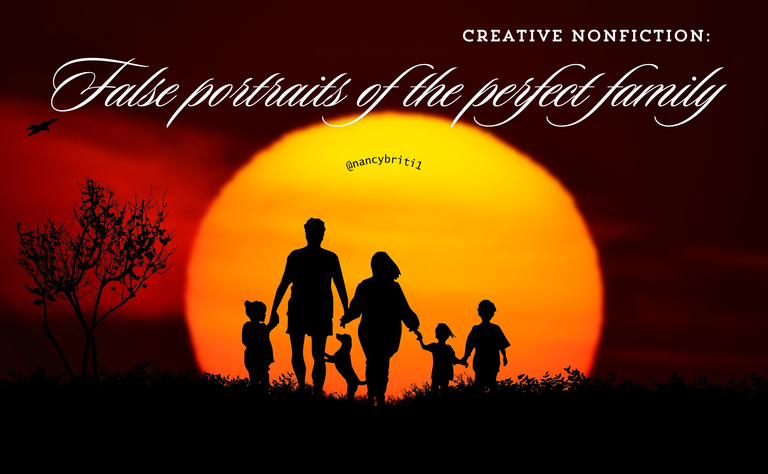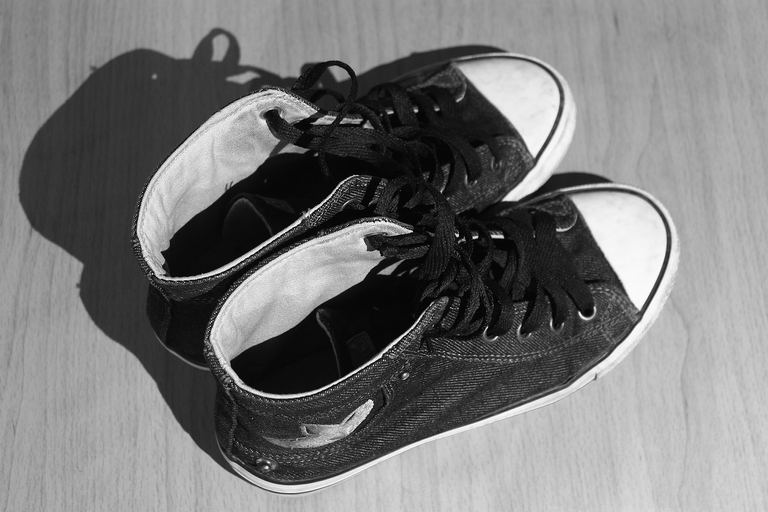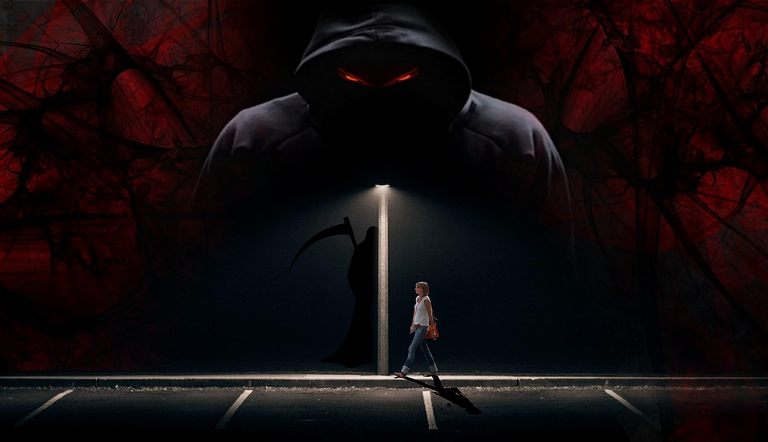Creative Nonfiction: False portraits of the perfect family/ Falso retrato de familia perfecta (ENG/ ESP)

False portraits of the perfect family

"Mum, she told us that when our father comes back from his trip, they'll buy us pink shoes because these are only good for school," Xiomarita boasted, and I couldn't help lowering my eyes slyly and comparing their shiny black shoes and my own worn and faded canvas shoes, which had belonged to my sister and which I had inherited because supposedly my parents still had a useful life and the money they earned was for food and not for unnecessary things.
These boasts of my friends created in me a dissatisfaction with what I had and with what my parents could give me:
"Xiomarita and Edicta's parents give them everything they ask for," I dared to complain in a low voice, “If I want new shoes, they don't give them to me,” I said, looking angrily at those sad shoes that looked like dead fish on my feet.
"There are priorities, Nancy. Your shoes are still good, they're not broken, and there are more important things to buy. Besides, your shoes are beautiful, they belonged to your sister," my parents argued, looking at the shoes with pride, as if they were a family heirloom.

"But Xiomarita and Edicta's parents gave her permission to go to the party!" -I replied as if that premise was enough for my parents to do the same.
"But they are one thing and we are quite another. We're not going to give you permission, full stop. There is no discussion about that. You're still a child and you can't be alone in the street," my mother often said with an air of weariness, bored that every decision they made, I compared it to the decisions of the other parents.
Many times, while crying in my room, I lamented my fate: Why couldn't my parents be like my friends' parents who were so accommodating, I thought with the firm belief that my life would be better with different parents.
Far from giving in and being more permissive, my parents made the dangerous decision to antagonise and criticise the actions of my friends and their parents:
"How can these gentlemen go on a trip and leave two teenagers alone in the house, without any adult supervision? They are crazy!" -my parents exclaimed in outrage.
"They trust their daughters!" -I expressed with a certain irony and bitterness, letting them see that I was angry with them.
"You can trust your children, but you can't trust the environment, the people who are waiting for the slightest opportunity to do harm," my parents tried to explain in a calm and gentle tone that sometimes shocked me. Those assumptions of danger were far from my head. My youthful imagination did not register the word danger or evil as shadows behind the door.

But the most interesting thing was that some time later, in a conversation by mobile phone, via text messages, Xiomarita, who now lives in another country and has gone through difficult situations, confessed to me:
_"Edicta and I always said that we would have liked to have parents like yours. They were always looking out for you, that nothing bad would happen to you, that no one would hurt you".
I remember that at that time I felt a feeling swell up like a balloon in my chest. That feeling, I have come to recognise over time, is a mixture of gratitude and pride, similar to what my parents felt when they saw those old shoes.

All images are free of charge and the text is my own, translated in Deepl.


Thank you for reading and commenting. Until a future reading, friends
![Click here to read in spanish]
Falso retrato de familia perfecta
Xiomarita y Edicta me habían vendido la idea de que tenían una vida perfecta: una familia feliz y unos padres consentidores que complacían los caprichos infantiles por más absurdos que parecieran:
_Mamá, nos ha dicho que cuando nuestro padre llegue de viaje, nos comprarán zapatos rosados porque estos solo sirven para ir al colegio –presumía Xiomarita y yo no podía dejar de bajar mis ojos disimuladamente y comparar los zapatos negros y brillantes de ellas y los zapatos de lona míos, desgastados y descoloridos, que habían sido de mi hermana y que yo había heredado porque supuestamente mis padres todavía aquellos zapatos tenían una vida útil y el dinero que ellos ganaban era para comida y no para cosas innecesarias.
Estos alardes de mis amigas creaban en mí una inconformidad con lo que yo tenía y con lo que mis padres podían darme:
_Los padres de Xiomarita y Edicta le dan todo lo que ellas piden, -me atrevía a quejarme en voz baja- Si yo quiero unos zapatos nuevos, no me lo dan, decía yo mirando con rabia aquellos tristes zapatos que parecían peces muertos en mis pies.
_Hay prioridades, Nancy. Tus zapatos aun sirven, no están rotos, y hay cosas más importantes que comprar. Además tus zapatos son bonitos, pertenecieron a tu hermana –argumentaban mis padres mirando los zapatos con orgullo, como si fueran una reliquia familiar.
Sin darme cuenta e inflados por las cosas que mis amigas me contaban, los padres de ellas se fueron convirtiendo en figuras perfectas e ideales que yo deseaba tener como familia y mis propios padres se convirtieron en los villanos de la historia:
_¡Pero es que los padres de Xiomarita y Edicta le dieron permiso para ir a la fiesta! –respondía como si aquella premisa, fuera suficiente para que mis padres hicieran lo mismo.
_Pero una cosa son ellos y otra muy distinta somos nosotros. No te vamos a dar permiso y punto. No hay discusión sobre eso. Tú eres una niña todavía y no puedes estar sola por la calle –expresaba muchas veces mi madre con un aire de cansancio, aburrida de que cada decisión que ellos tomaban, yo la comparaba con las decisiones de los otros padres.
Muchas veces, mientras lloraba en mi cuarto, me lamentaba de mi destino: ¿Por qué mis padres no podían ser como los padres de mis amigas que eran tan complacientes?, pensaba yo con la firme creencia que mi vida sería mejor con unos padres distintos.
Lejos de dar su mano a torcer y ser más permisivos, mis padres tomaron la peligrosa decisión de contrariar y criticar las actuaciones de mis amigas y sus padres:
_¿Cómo es que esos señores se van a ir de viaje y van a dejar a dos adolescentes solas en la casa, sin ninguna supervisión adulta? ¡Están locos! –exclamaban escandalizados mis padres.
_¡Es que ellos confían en sus hijas! –expresaba yo con cierta ironía y amargura, dejándoles ver que estaba enfadada con ellos.
_Uno puede confiar en los hijos, pero no confiar en el entorno, en las personas que están esperando la mínima oportunidad para hacer daño –intentaban explicar mis padres con un tono calmado y apacible que a veces me resultaba chocante. Aquellas suposiciones de peligro estaban muy lejos de mi cabeza. Mi imaginación juvenil no tenía registrada la palabra peligro o maldad como sombras que estuvieran detrás de la puerta.
No recuerdo cuándo fue, pero me imagino que fue a medida que iba madurando o fue cuando la madre de Edicta y Xiomarita se fugó de la casa y el padre se entregó a la bebida, que la figura de aquellos padres, tan comprensivos y liberales, se transformó en una sombra gris y triste, muy parecida a la derrota. En pocas palabras: dejé de ser fan de ellos, porque descubrí que mis ídolos tenían pies de barro.
Pero lo más interesante fue que tiempo después, en una conversación por celular, a través de mensajes de texto, Xiomarita, quien en este momento vive en otro país y ha atravesado por situaciones difíciles, me confesó:
_Edicta y yo siempre decíamos que nos hubiese gustado tener unos padres como los tuyos. Ellos siempre estaban pendientes de ti, que no te pasara nada malo, que nadie te hiciera daño.
Recuerdo que en esa oportunidad sentí que un sentimiento se inflaba como un globo en mi pecho. Ese sentimiento, con el tiempo lo he logrado reconocer, es una mezcla de gratitud y orgullo, parecido a lo que sentían mis padres al ver aquellos zapatos viejos.
👏 Keep Up the good work on Hive ♦️ 👏
❤️ @bhattg suggested sagarkothari88 to upvote your post ❤️
🙏 Don't forget to Support Back 🙏
Thanks for your support, friends
@nancybriti1, you are most welcome!
Please Support Back
Here is !ALIVE token gift for you
Here is !LUV token gift for you
Here is !PIZZA token gift for you
It's quite funny how we have a lot of people like Xiomarita, they make you believe they have a perfect life.
I think more than we ever imagined! Especially in this day and age, with social media, we believe that other people have better things than us. Greetings
When we are kids we think that we have very protective parents and that they don't let us do anything fun, but as we grow up we understand that everything was for our well-being. A thought-provoking experience.
Thanks for sharing your experience with us.
Happy Wednesday.
I agree with you. Only with time did we come to see how privileged we were to have protective parents, who only made our youth easier. A beautiful day to you
Thank you, friends! Happy and grateful for the support.
$PIZZA slices delivered:
@hivecurators(5/5) tipped @nancybriti1
What an interesting story. This happens most often. We tend to look down on what we have and wish to get what we assumed is better. When the reality dawn on us, we come back to appreciate who we are and what we have.